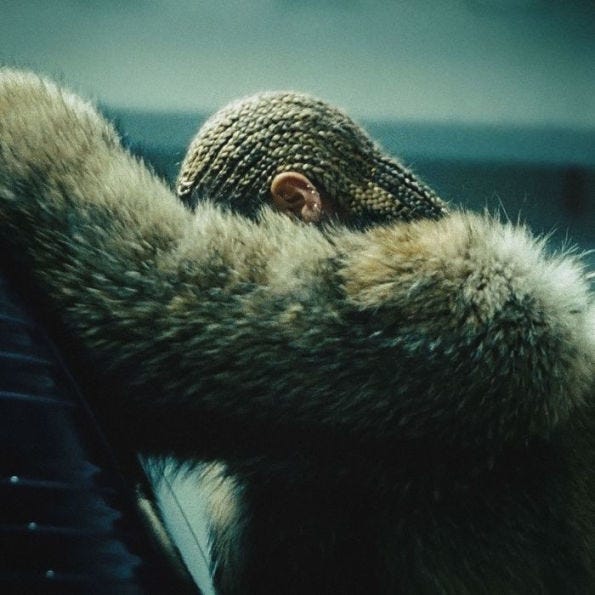Growing up, secret projects weren’t a thing because there was no way of just ‘dropping’ something new on the market.
Social media didn’t exist, nor did instant streaming, meaning the only way to get something out there was through old-fashioned distribution which required substantial investment and marketing. Every piece of entertainment you consumed was teased long in advance.
I knew Madonna’s next album at least six months ahead, because there would be signs for it everywhere — the record store, the department store, even the grocery store. (Funny story: when I was 12, I saw the signs teasing ‘Erotica’ near the tennis rackets at Target and started badgering family members about what it meant and my older brother loudly retorted that a 12 year-old could go to jail for asking that in public.)
I knew Disney’s next animated movie by watching the trailers attached to the one the year before — Beauty & the Beast teasing Aladdin which teased Lion King which teased Pocahontas which teased The Hunchback of Notre Dame (I remember all this now without looking it up; the marketing is that emblazoned in my memory.)
All content was ruled by the giants: the record labels, the movie studios, the big publishers, who determined how and when things were put out. The true Deep State.
So when Beyonce bucked all that and dropped Lemonade online in 2016, the first time I ever remember a major artist just throwing something down with no warning or preparation, I remember feeling exhilaration both as audience and artist. There was a dopamine rush in giving absolutely no preview to the toiling behind the scenes and just launching something fresh, so that marketing didn’t influence the hype and the Work was King.
Taylor Swift soon adopted the strategy, but added the savvy twist of not dropping the actual work, but the ‘idea’ of the work. Namely, a release date for her secret project. Meaning it had the emotional spike of a launch… but it still functioned as a traditional marketing/hype machine countdown to the actual debut.
I’ve started experimenting with this approach the past few years.
In fact, about thirty minutes after this diary arrives in your inbox, I’ll be posting a teaser image on social media, counting down to a secret project that me and a friend have been working on for nearly 6 months.
A secret project we’re about to drop in less than 48 hours.
Everything about the project will soon be revealed, but I thought I’d talk a little bit about the ethos behind it. The same ethos that went into the creation of this Diary.
An ethos that is a complete 180-degrees from the way I thought about my career up until a few years ago.
For a long time, Karl Lagerfeld was my muse and hero.
The French legend did it all — fashion, film, photography, music, even furniture design — but he had one specific prescription all of it: never expose the process and instead, unveil each piece of work like it had been done by magic. “Always impeccable, always professional,” was his mantra. No sign of sweat or effort, no matter how rigorous his work ethic, just Santa-esque reliability and a relentless feed of new work dropped down a chimney.
It’s the same reason why I loved Roger Federer, the greatest tennis player of all time (Djokovic fans can come at me and I will play a tiny violin). Federer played with such ease, such nonchalant charm, the “I woke up like this” aesthetic, versus his rivals Rafal Nadal and Djokovic, who seethed with the brutality of process, exertion, and iron-forged will. Federer didn’t make a sound, let alone grunt. He didn’t argue with umpires. He barely made a single facial expression during his wins and losses, the tennis speaking entirely for itself. (Occasionally, he flicked his hair out of his face when he was really mad.)
This was what I aspired to, as well. For 10 years of writing The School for Good and Evil, I never let anyone in on my process. All the effort, torment, intensity of that decade was completely walled out. Instead, I’d disappear into a cave or pretend in my Instagram posts that all was light and airy and easy and then the books would arrive like clockwork, every 12-18 months, with no hint of the masochism and intensity that went into it.
Part of this was privacy. I liked the Federer/Lagerfeld model of barricading ‘me’ away, the true human behind caution tape, completely off-limits, so that no one could ever pin me down. All you’d ever get to see was there on the page (or in my cryptic photo shoots). I think it’s what also allowed me to avoid getting drawn into social media battles or being targeted or cancelled for any content in the novels or being associated with having an ‘identity’ or ‘point of view’ that was problematic. Because no one knew me. They only knew the books.
Sometimes, I wonder, if another reason for caging people out was a desire for competitive advantage. Growing up, attending a high-pressure, high-achieving high school, where getting into an Ivy League school was the goal of all goals (the curse of being an immigrant’s child in the early 90s, ugh)… it also meant just being very close-to-the-vest as to what you were doing and how you were doing it, lest someone get ahead of you. (This was the era where Harvard Law School students ripped out the pages of books in the library to prevent other students from having access to them.) Looking back, it was all very, very stupid and incredibly myopic, but that’s just how things were back then. The routes to success were few and well-crammed and people lost their mind while making the pilgrimage.
All of this taken together, then, made me very unlikely to let people in as to what was happening behind the scenes of a book.
But things changed a few years ago.
Specifically, when I sensed the nuke bomb of AI coming for our world. Which I talked about extensively in last week’s diary… but I also left out one key thing.
A prediction that has changed the way I work.
I truly believe that in 2 or 3 years, we’ll no longer trust the work itself. The novel. The movie. The photograph. The song. We’ll have perpetual doubts as to whether it’s human work or robot-made. All content will languish in a wary soup of cyborgian creation.
But what we will start to fetishize — quite intensely — is artistic process. Instead of listening to a song, we’ll listen to a 30-minute edit of the making of the song. Instead of watching a movie, we’ll watch the companion documentary of how it was made, day by day. Instead of reading a book, we’ll want the diary of its writing and a time-lapse of track change revisions and videos of the author just sitting at his desk, Twitch-streaming his writing day.
Process is going to be King instead of Content. Mark my words. And if an author isn’t ready to open up that process and bare his way of working, he or she risks his work becoming part of the indiscernible mosh pit of machine generated content. Without deep-dive proof of the artist’s process, the work will become obsolete. The ends will no longer justify the means. Instead, the means will be part and parcel of any appreciation of the ends.
This is the future. At least as I see it.
So welcome to the new Me.
No more hiding my process or my trade secrets.
It’s all yours now. Doors open. Welcome to the Madcap Laboratory.
Not just here in this diary… but in some other places too.
Which, ironically, is what this new ‘Secret’ Project is all about.
In two days, you’ll find out what it is.
Your turn.
How do you feel about an author letting you in on their process versus just experiencing the finished work? Do you think you’ll care more about an artist’s process as AI takes hold?
Until next week —












I think hearing about the process of an author’s work will be pretty cool. It will be interesting to learn what happens behind the scenes when they’re writing, and all the hard work that goes into the books. Also, oh my gosh a secret project!!! I can’t wait! You are so awesome Soman! :)
I love the finished product as much I'd like the work behind it.
It's true that AI has seeped in so much that true artists are being left behind, but I don't think AI can create the way the human mind does nor will it be the topmost quality.